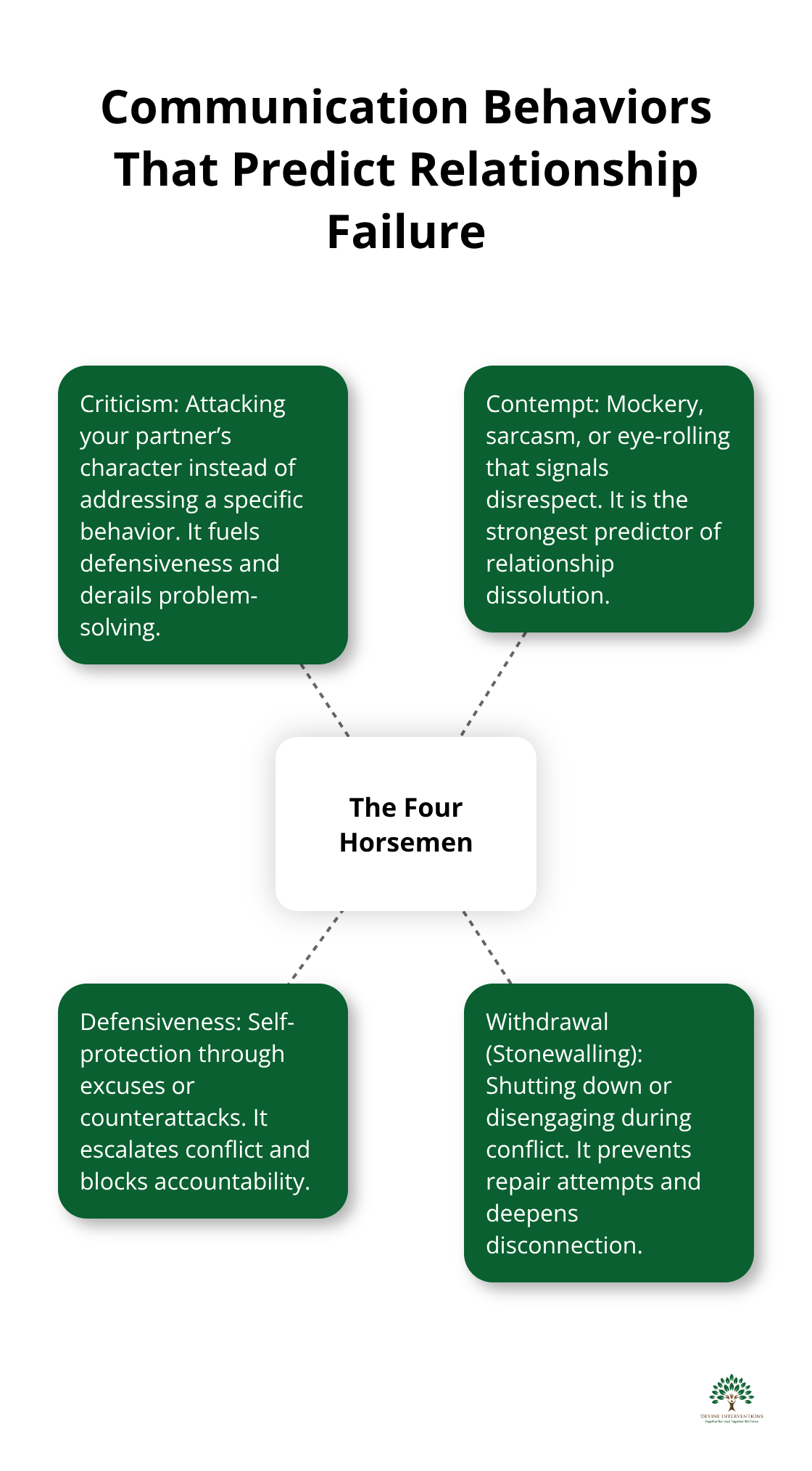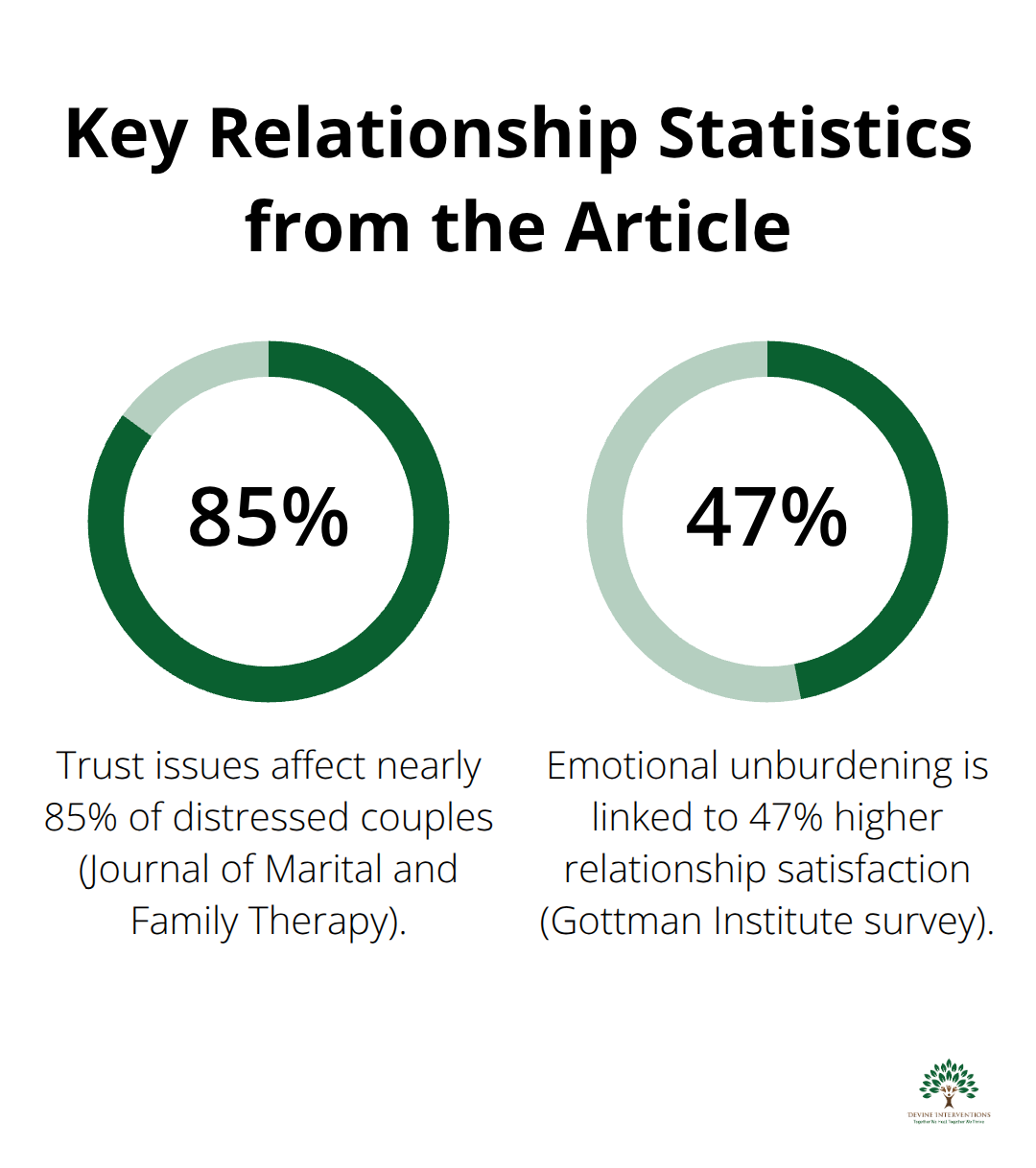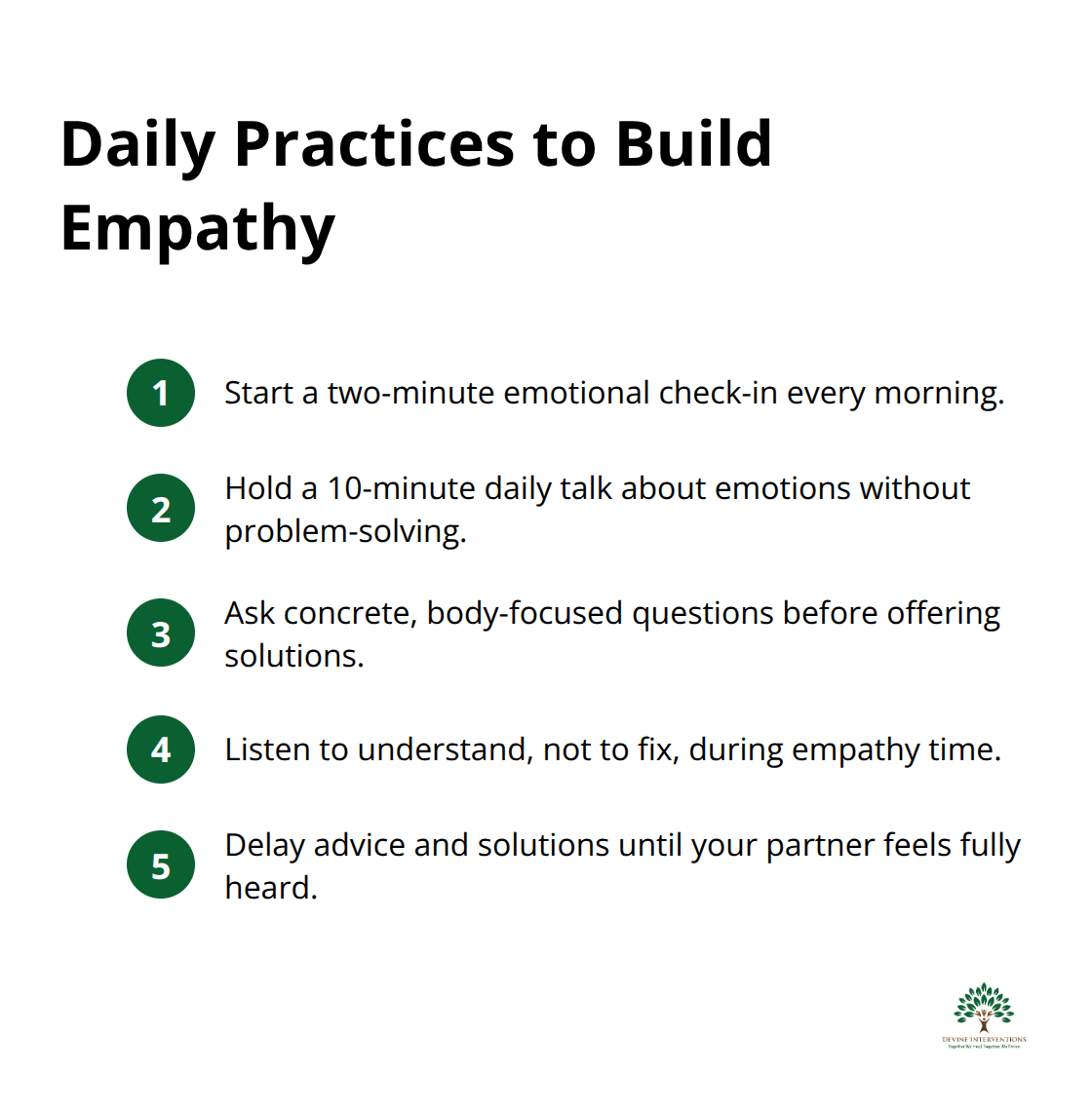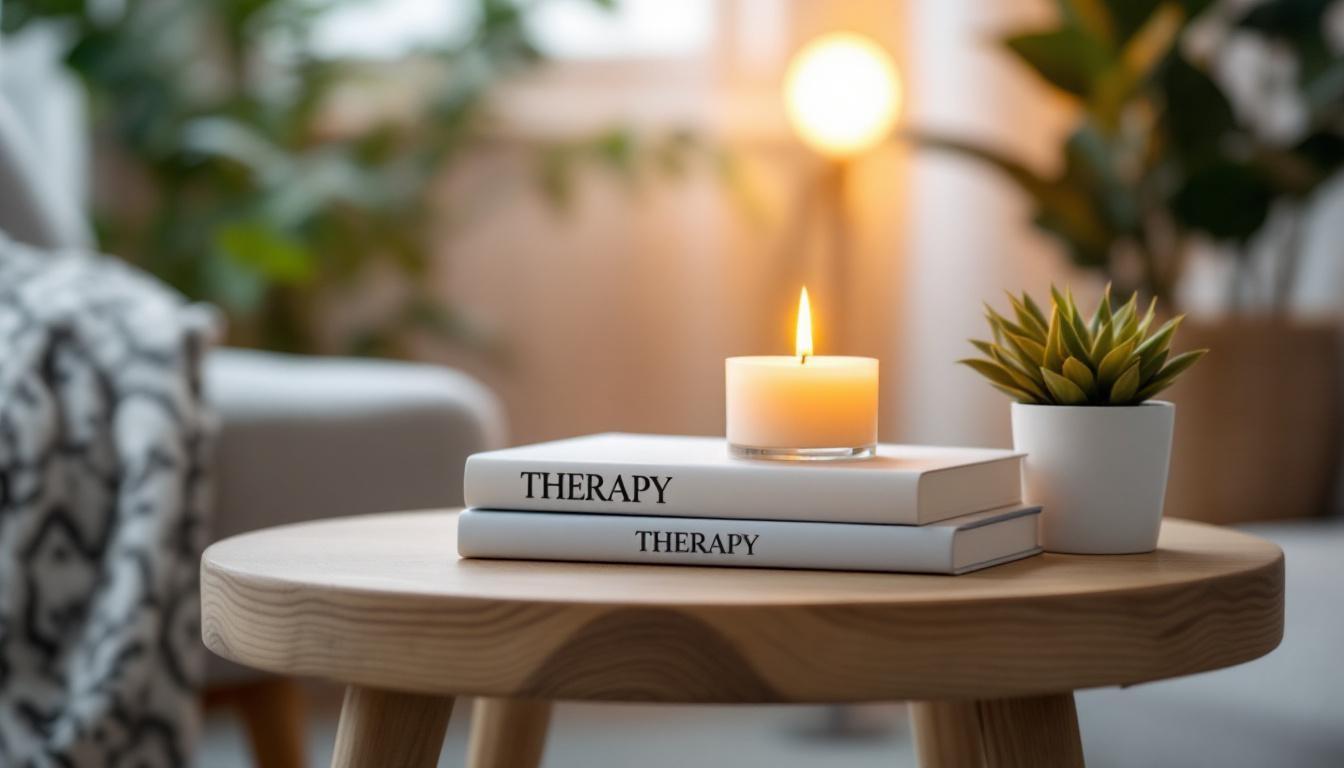Relationships face real challenges that can leave couples feeling disconnected and frustrated. Communication breaks down, trust erodes, and conflicts seem impossible to resolve.
We at Devine Interventions understand these struggles affect countless couples in our community. Professional relationship therapy tips can transform how partners connect, communicate, and rebuild their bond together.
What Relationship Problems Affect Most Couples
Communication Patterns That Damage Relationships
Research from the American Psychological Association shows that communication problems drive couples to seek professional help. Partners respond defensively, criticize each other, and shut down emotionally, which creates toxic cycles that push them further apart. Most couples wait six years before they address these patterns, and this delay allows small misunderstandings to become major relationship threats. The Gottman Institute identifies four specific communication behaviors that predict relationship failure: criticism, contempt, defensiveness, and withdrawal.

These patterns escalate quickly and transform minor disagreements into relationship-ending conflicts.
Trust Breakdown and Emotional Distance
Trust issues affect nearly 85% of couples who experience relationship distress, according to the Journal of Marital and Family Therapy. Emotional infidelity, broken promises, and lack of transparency create walls between partners. When trust erodes, emotional intimacy disappears, and couples feel like strangers who live in the same house. Partners stop sharing their inner thoughts, dreams, and fears (creating a cycle of disconnection that becomes harder to break over time).

Conflict Escalation Without Resolution
Couples who cannot resolve conflicts constructively face significant relationship challenges. Unresolved arguments pile up and create resentment and hopelessness. Most couples lack the skills to address disagreements without attacking each other’s character or bringing up past hurts. Instead of finding solutions, they engage in blame games that damage their bond. Without proper conflict resolution techniques, even minor issues become relationship disasters that threaten the foundation of their partnership.
Professional therapy provides proven strategies that address these destructive patterns at their source. Therapists teach couples specific communication techniques that replace harmful behaviors with connection-building skills.
How Communication Transforms Your Relationship
Effective communication requires specific skills that most couples never learn. The Gottman Institute research demonstrates that couples who master core communication techniques experience significant improvements in relationship satisfaction.
Master Active Listening for Deeper Connection
Active listening forms the foundation of healthy communication. Partners must stop preparing their response while the other person speaks and instead focus completely on understanding their partner’s perspective. This means putting down phones, making eye contact, and reflecting back what you heard before responding.
Couples who practice this technique for 15 minutes daily report significant reductions in misunderstandings and conflicts. The process requires discipline because most people listen to respond rather than to understand.
Express Emotions Without Attacking Your Partner
Most people express frustration through blame and criticism, which triggers defensiveness and escalates conflicts. Successful couples use I-statements that focus on their own feelings rather than their partner’s behavior.
Instead of saying “You never listen to me,” effective communication sounds like “I feel unheard when conversations get interrupted.” This approach reduces defensive responses through emotionally focused therapy techniques.
Timing matters too. Address emotional concerns when both partners are calm and have privacy. Couples who schedule weekly 20-minute relationship check-ins prevent small issues from becoming major problems.
Create Boundaries That Protect Your Connection
Healthy boundaries strengthen relationships rather than restrict them. Partners need clear agreements about personal space, family involvement, and individual interests. Couples who establish boundaries around technology use report higher relationship satisfaction (including phone-free meal times and dedicated conversation periods without distractions).
Financial boundaries also prevent major conflicts. Successful couples agree on spending limits and financial decisions before problems arise. Setting boundaries with extended family protects the couple’s relationship from outside interference and reduces stress by creating clear expectations for everyone involved.
These communication strategies work best when couples also focus on rebuilding the emotional foundation that connects them at a deeper level.
How to Rebuild Emotional Connection
Strengthen Empathy Through Daily Practice
Emotional intelligence determines relationship success more than compatibility or attraction. A survey by the Gottman Institute found that couples who practiced “emotional unburdening” reported 47% higher relationship satisfaction. Partners must learn to recognize their own emotional triggers before they can understand their partner’s feelings.
Start each day with a two-minute emotional check-in where both partners share their current mood without judgment or advice. This simple practice develops emotional awareness and prevents misunderstandings from escalation into major conflicts.
The American Association for Marriage and Family Therapy found that couples who spend 10 minutes daily to discuss emotions without problem-solving show dramatic improvements in empathy. Focus on understanding rather than fixing your partner’s feelings. Ask specific questions like “What does that frustration feel like in your body?” instead of offering solutions immediately.

Create Vulnerability Without Fear
Safe emotional spaces require specific conditions that most couples never establish. Partners need designated times and places where difficult conversations can happen without interruption or judgment. Couples therapy is highly effective in relieving relationship distress and helping partners establish these crucial communication patterns.
Turn off all devices, maintain eye contact, and agree that neither partner will become defensive during these conversations. Share one fear, one hope, and one thing you appreciate about your partner each week. This structured approach removes the guesswork from emotional intimacy and creates predictable safety for both partners.
Rebuild Trust Through Consistent Actions
Trust reconstruction requires daily behaviors rather than grand gestures. The Gottman Institute research shows that couples rebuild trust through small, consistent actions over 18-24 months. Start with complete transparency about daily activities (including sharing phone passwords and social media accounts).
Schedule daily 15-minute trust-building conversations where partners share their whereabouts, feelings, and any triggers they experienced. Keep every promise, no matter how small, because broken commitments reinforce trust issues. Apologize immediately for mistakes without making excuses, and ask specifically what your partner needs to feel secure. Trust returns through predictable reliability, not dramatic promises.
When couples invest in professional support early, they develop stronger conflict resolution skills and rebuild emotional intimacy more effectively than those who attempt to navigate these challenges alone.
Final Thoughts
These relationship therapy tips provide a foundation for transformation, but lasting change requires professional guidance and consistent practice. Communication strategies, emotional connection techniques, and trust-building exercises work best when couples receive expert support throughout their journey. Research consistently shows that couples who work with trained therapists achieve deeper, more sustainable improvements than those who attempt to navigate relationship challenges alone.
Professional guidance helps partners identify destructive patterns they cannot see themselves and provides accountability for new behaviors. Trained therapists offer evidence-based approaches that address the root causes of relationship distress (rather than just surface-level symptoms). We at Devine Interventions understand that taking the first step toward relationship improvement feels overwhelming.
Your relationship deserves the investment of professional support. Contact Devine Interventions today to schedule your comprehensive assessment and begin the stronger, more connected partnership you both want. Every day you wait is another day your relationship could thrive instead of struggle.







